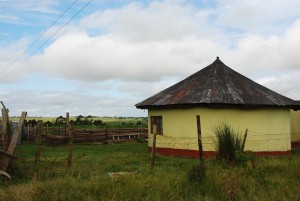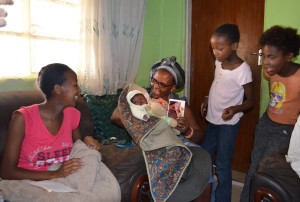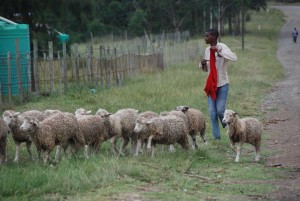Day Eleven
Poverty is not an accident. Like slavery and apartheid it is man-made and can be removed by the actions of human beings.
-Nelson Mandela
Today was a day to embrace our Malungeni neighborhood with no bus trip scheduled. This gift of time gave us the opportunity to enjoy the company of our hosts and friends who stopped by for a visit.
Our afternoon was spent in a very leisurely "walk about" the countryside visiting a few people who welcomed us into their homes. Most families were quite busy cooking the ingredients of the food distribution of last evening. Children drawn to our small group were given friendship bracelets and marshmallows (considered sweets).
 A typical dwelling in Malungeni is a small building with mud walls and a thatched roof. Most homes have electricity and water, collected in a reservoir from rainfall, the only water source. Nearly everyone raises chickens and a few families raise sheep, pigs and cattle. Vegetable gardens are a primary source of food, commonly grown vegetables would be corn, squash, cabbage, beans, onions, pumpkin,spinach and carrots.
It is customary for families to bury their ancestors on the family property to return the body to the land from which it came. Markers for these final resting places range from granite headstones to simple stones.
A typical dwelling in Malungeni is a small building with mud walls and a thatched roof. Most homes have electricity and water, collected in a reservoir from rainfall, the only water source. Nearly everyone raises chickens and a few families raise sheep, pigs and cattle. Vegetable gardens are a primary source of food, commonly grown vegetables would be corn, squash, cabbage, beans, onions, pumpkin,spinach and carrots.
It is customary for families to bury their ancestors on the family property to return the body to the land from which it came. Markers for these final resting places range from granite headstones to simple stones.
 The local children attend either the primary or high school in the area walking many miles rain or shine. Although the cost is low, tuition and school uniforms are required.
Since 2007, we have enjoyed the tradition of finding the newest baby in the neighborhood to give a quilt handmade by Virginia Malecha who is Karen Dalebroux's Mother. Karen, Todd and Alexis Dalebroux were here with the 2007 delegation.
This year we were pleased to know our friend and hostess, Olga, has a two week old granddaughter, LuLu. Lulu and her Mom were happy to receive this lovely gift along with hand knit hats and a Mother Bear. This gift was presented by Eileen Keilbrook.
The local children attend either the primary or high school in the area walking many miles rain or shine. Although the cost is low, tuition and school uniforms are required.
Since 2007, we have enjoyed the tradition of finding the newest baby in the neighborhood to give a quilt handmade by Virginia Malecha who is Karen Dalebroux's Mother. Karen, Todd and Alexis Dalebroux were here with the 2007 delegation.
This year we were pleased to know our friend and hostess, Olga, has a two week old granddaughter, LuLu. Lulu and her Mom were happy to receive this lovely gift along with hand knit hats and a Mother Bear. This gift was presented by Eileen Keilbrook.
 Prior to our evening meal we listened as Reverend Spiwo Xapile shared with us the story of his childhood growing up in Malungeni and the social and economic challenges he faced as a black child in rural South Africa durning apartheid. It is inspiring to hear of his perseverance to become a minister and leader. Rev. Xapile has inspired and mentored thousands of individuals, including Arm In Arm In Africa, and continues in his quest to make a better world for black South Africans.
Prior to our evening meal we listened as Reverend Spiwo Xapile shared with us the story of his childhood growing up in Malungeni and the social and economic challenges he faced as a black child in rural South Africa durning apartheid. It is inspiring to hear of his perseverance to become a minister and leader. Rev. Xapile has inspired and mentored thousands of individuals, including Arm In Arm In Africa, and continues in his quest to make a better world for black South Africans.
